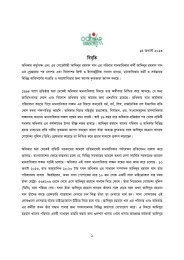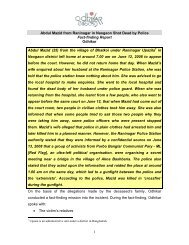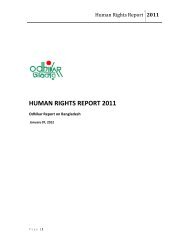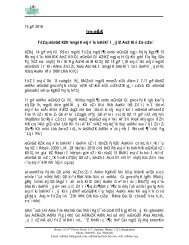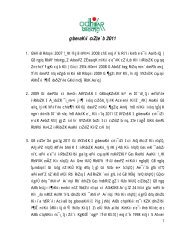Please - Odhikar
Please - Odhikar
Please - Odhikar
You also want an ePaper? Increase the reach of your titles
YUMPU automatically turns print PDFs into web optimized ePapers that Google loves.
cultivating and having their livelihood there. This case has been mentioned because the military<br />
was involved, but there are many other cases where the landlords are evacuating the farmers in a<br />
much, much larger scale and for other reasons. I would like to raise the issue that it is seldom<br />
that human rights activists work on the protection of the farmers and sometimes they wonder<br />
whether farmers rights are human rights or not. I would like to bring up this issue because most<br />
of the human rights violations rise from the economic marginalisation or economic inequality we<br />
see here in our country. 40 percent of people are below the poverty line and believe that<br />
inadequate access to justice is the main reason of their poverty. In order to seek justice, a peasant<br />
farmer has to pay a big amount of money to go to the court and at the end of the day he will not<br />
get justice from the court. Those are the people who are victims and witnesses that never get<br />
protection. They do not come forward because they are marginalised and they will be further<br />
victimised if they come forward to seek justice. Therefore, economic inequality should be<br />
addressed if we want the human rights situation get better in our country. I would also like to say<br />
that it is not only the victims we need to think about. We must think about the rights of the<br />
people who have committed crimes, who are in jails, the situation inside the jail is very hostile.<br />
There are people incarcerated who committed a minor crime because of a situation that they<br />
could not control and who must then spend their lives in jail to wait for justice. There are many<br />
people in the jail that did not commit a crime, like children and women. They are forced to live<br />
in jail and a criminal environment and never get the chance to become a civilized citizen. We<br />
should think about whom we are calling criminals and who have made them criminals? These<br />
people didn't have the chance of education; decent living or earning a livelihood so that they<br />
could overcome their poverty. As a nation we should not let such things happen. Such inequality<br />
can and has also resulted in the formation of criminal gangs. There are people who used to live<br />
in peace in the village but due to the increase in rural poverty and the fact that rural youth have<br />
no livelihood option, because of lack of education, and no access to lands, they have joined<br />
gangs and started committing crimes. In Saeedur Rahman's speech, the Hudood Ordinance in<br />
Pakistan resulted in a higher scale of violence against women due to the fact that women<br />
claiming to have been raped failed to produce acceptable evidence of four people. That,<br />
however, is not the only reason; it is a very complicated issue. As far as violence against women<br />
is concern, the issue is a global one and there are many cases where women do not get justice<br />
from the system. When I was in the US, a case involving the Kennedy family became very<br />
controversial. I was there for four years, and observed that the case concluded without the victim<br />
( a young woman) receiving any justice. I think economical marginalisation leads to this kind of<br />
human rights violation. It is aggravated if there is more poverty and fewer resources that the<br />
state has. I am not defending the state because the state has failed to realize the importance of<br />
the issue; the citizens have rights to protection. The other day Subodh from Nepal was saying<br />
that the citizens created a State because they want the State to defend their freedom. But actually<br />
the State is violating the rights of people and is not protecting the people's rights. Pakistan is not<br />
a signatory of the Convention Economic, Social and Cultural Rights. I will site a couple of<br />
example about cultural rights in Pakistan. The party that was organised was a Civil Servants<br />
Club party in Pakistan, and we found that the farmers could not enter the dining room wearing a<br />
lungi. In an area like the Punjab, where the lungi was almost a national dress, this club barred<br />
entry to those wearing the same. The question thus arises about the identity of such civil servants<br />
and so called civil citizens of the society who are depriving the people from following their own<br />
culture. That also leads us to the case in France where Muslim women are forbidden to wear<br />
Report 2005<br />
65




